Get up, Stand up: When your musical heroes defied the authoritarian regime

July 2024 was a month of terror, defiance, and uncertain hope. Each day unfolded as pages of history, as the student-led movement surged into one of the most seismic moments in Bangladesh's history. What began as chaos ended after the momentous day we now call 'July 36'—in a fragile new dawn.
In those charged days, artistes from across the country stood with the people. Musicians, too, found their voice in the revolution. They came together under a single banner, "Get Up, Stand Up"—a name borrowed from Bob Marley's timeless anthem. And with that spirit—"Get up, stand up, stand up for your rights"—they raised their voices not just for rights, but against brutality, mass killings, and fear that soaked the monsoon nights.
The streets bled, but the songs did not falter. Amidst dread and darkness, they stood united—and they sang.
We reached out to some of the voices who stood at the heart of this movement—those who helped unite musicians, and others who joined, driven by a deep sense of humanity. Iqbal Asif Jewel, Artcell's guitarist, Highway band's vocalist Hasan Aether, the singer, composer, founder and choir director of Ghaashphoring Choir, Armeen Musa, veteran singer Elita Karim, and vocalist Rezaul Karim Leemon, who reflected on what they witnessed, what they felt in those charged days, and how that moment still echoes, one year later.
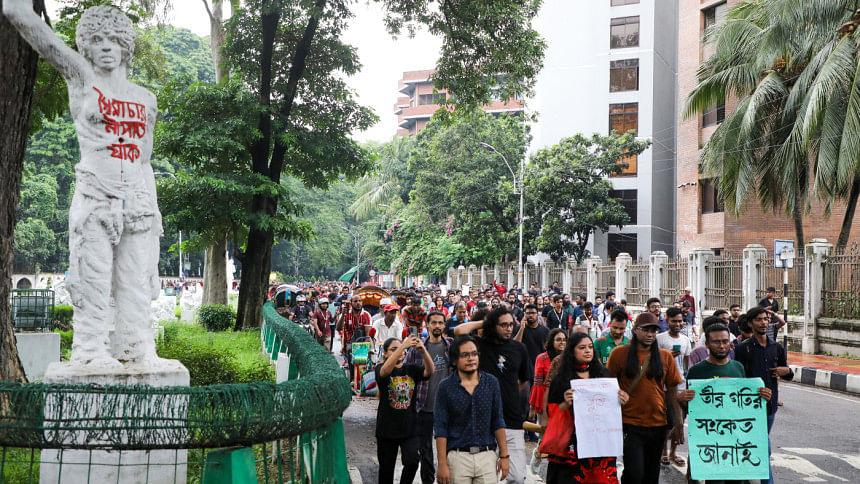
Before uniting all the voices
The moment we begin to grasp what politics means, someone is always there with the same wisdom: It's best not to talk about politics—or care too much. As if indifference were a virtue, and silence a survival tactic.
Every conversation seems to require a disclaimer— this is a 'non-political' opinion. Yet, the July Uprising shattered all such barriers, breaking the rigid protocols imposed over the past 16 years—protocols that bred oppression and pushed the nation to its boiling point. Yet, it was not a political matter, but one of survival, breaking through the barriers of odds.
"We all were individually expressing our grief and anger through our social media handles," said Hasan Aether, one of the group's founders. "I remember it was as early as July 18." Their plan to gather at Rabindra Sarobar was scheduled for August 3. Adding to this, Armeen Musa said, "Before Shaheed Minar on July 28 at zero point, I saw the one-point demand in the hands of Rehnama ma'am. It said 'Chhatro Khuni' (student murderers), I didn't join in their chants; I was still scared. Later, at Shaheed Minar, a group of people from all walks of life—businesspeople to day laborers—made me realise it was time to be braver."
"My direct involvement with the movement truly began after the administration's extreme oppression of students and incidents of open fire," recalls Rezaul Karim Leemon.
"We basically stood for the students, against how they were fired on the streets by the police, and innocent people getting killed. We stood for justice, and it was never a political movement for us," said Jewel.
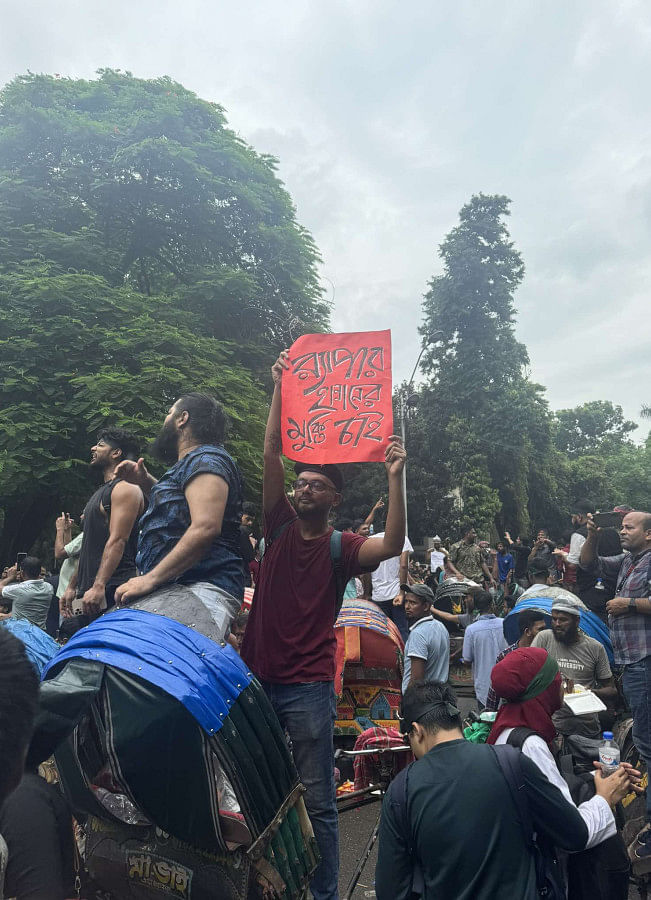
On August 3…
Major bands, musicians of the country, and young musical artistes--they all showed up as planned. From there, they moved to Shaheed Minar. Upon reaching, they saw people from all walks of life were present, chanting different slogans, out of which the one-point demand was the most powerful one, and shocking to many as well.
"There had been some murmurs about the one-point demand, but it was only after hitting the streets that I came to know more clearly about it, through the slogans and placards of various other protesting groups," shared Leemon.
"I didn't find myself separate from those students or protestors. From the beginning, artistes alongside Samogeet, Shayan apa, Ghaasphoring, and I were present," said Armeen. Many also said that musicians were bashed because they were late in responding. Although none of the artistes we spoke to for this article could verify such an incident, Armeen's response to this is, "It wasn't the students who showed frustration to me, but rather I to my fellow musicians. I still am angry with them for their blind loyalty towards a murderous dictator."
The emotions flooded with anger, grief, and at many points of fear, unpredicted by what was coming ahead. These people, who knew that appearing in such a rally might affect their careers, or even it could be life-threatening as well. Yet, they did it with full confidence, because it was now or never.
"16 years of suppression led many to boycott artistes who spoke out against injustice, and it was done by the big agencies that were affiliated with the government. Whenever anyone spoke, they were avoided, so we were aware of that. I believe Artcell was one of the first bands to protest against the violence, and then we saw how the revolution burst into the nationwide, and it even reached the international arena. We didn't think that we would win, but we were hoping and praying every second," asserted Jewel.
Jewel's 16-year-old son didn't fear to raise his voice. He shared that his son joined his school friends and united for the justice that was longed for. His wife also joined in.
"On August 3, at the Shaheed Minar, that's when I first heard—directly and in person—about the one-point demand," reminisced Elita. "We saw slogans demanding the release of Hannan, who had been arrested for his song 'Awaj Uda'," recalled Elita. "It was a tense moment, charged with adrenaline. Our purpose was clear: to stand against injustice and support the students facing arrests, attacks, and the unbearable bloodshed of innocent lives."
Elita further described the moment, "As I watched these young people march, one thought kept returning, what an incredibly brave generation this is. I'm grateful to have been part of it. As a citizen, I simply knew I had to be there. I had to be a part of this massive movement that I believed in."
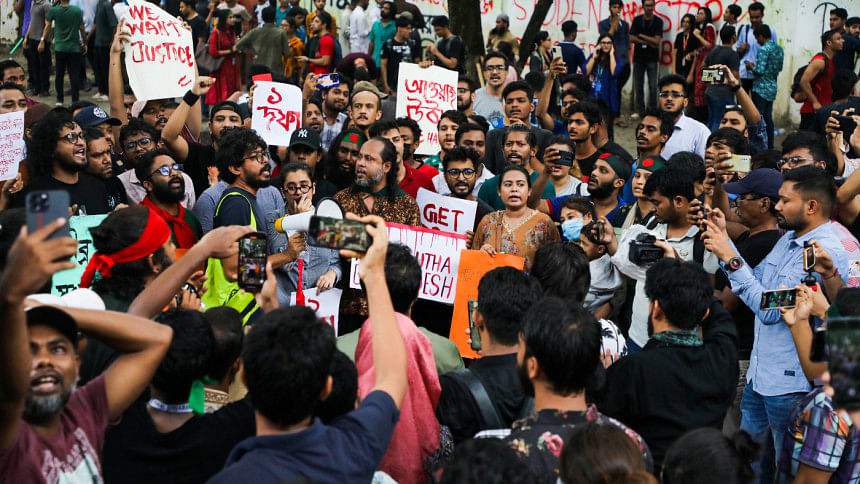
The fall of Hasina's regime…
"At that moment, it was quite emotional and scary for us. The situation was getting out of control, and the government was getting more aggressive with each passing second. We were paranoid about our lives, and we didn't think that the government would fall. We were hoping for a change that would bring something better," said Jewel.
"The fall of the government was something that had shocked me! I never imagined that the regime would collapse, fleeing in defeat," commented Elita. "I was certain that the government would have to answer for the unchecked atrocities. There was a shift in the wind, and we could all feel it; though nothing prepared us for what actually happened. I was simply going with the flow."
Like many others, Armeen's thoughts also culminated in fear. "I truly did not think the government would fall; rather, I was tense that more people would be killed.
Leemon made it clear when he said, "What kept running through my mind was that, somehow, the ongoing oppression and horrific violence needed to stop, and the real perpetrators must be brought to justice without delay."

Facing reality after a year
"After August 5, following the revolution, we were aware that we would not see stability anytime soon," said Hasan Aether. "However, our actions were solely aimed at addressing the wrongdoings that were happening to the students. To think realistically or practically, we knew that we had to go through a tough moment."
"After one year, nothing really changed in the sense that when the masses came to the roads for justice, after one year those who were on the frontline are enjoying the fruits, while the rest are still suffering, and we, musicians, didn't demand much, and we didn't get any recognition either."
"The hierarchy of the political figures in art and culture remains, and the wastage of money on banners and boring speeches still remains. It will take more than one year for us to make real change, I get that; however, I applaud those who have left their main jobs to attempt, but a lot of the old ways are very prevalent, and if the new elected govt isn't worldly, doesn't value art, diversity, and most of all human respect, then there's not much hope," added Armeen.
After the fall of Awami League's long tenure, on August 8, the new interim government took oath, showing a new ray of hope. What went through the minds of people?
That day marked a bittersweet one for Elita. "My dearest cousin, Abid Alam, passed away on August 8, after suffering for quite some time. That day, the interim took the oath. I was caught between pain and pride. I remember students taking charge of the roads, directing traffic—it felt like hope was finally rising. Looking back, maybe I was naïve to think things would instantly improve. We want change, but the system remains stubborn. The dream that everyone would suddenly become honest, follow rules, and end corruption felt, in hindsight, unreal."
"That idea was flawed because the toxicity we bear has been built up over many years, and detoxifying it will take time. This is how I feel after one year. We must be patient. It is high time that we work together to steer the country toward a positive future. The biggest challenge is mob violence and unreasonable demands. Sadly, this has become a tactic to push agendas, but in the rush to respond, it risks undermining long-term progress. We must not forget that we came together as a single unit to create positive change, and staying mindful of that is crucial."
Jewel's observation after a year since the oppression of 16 years explained that in this one year, nothing remarkable has changed that can be said, at least from what everyone had expected from the revolution. "In truth, over the past year, we haven't really seen the kind of progress we had hoped for. A new party has come to power — they're talking about change — but visibly, there hasn't been any improvement. Ordinary people had much higher expectations, and perhaps due to legal complexities or various other reasons, things just aren't happening in time. The administration isn't really in a very strong position either. Before the elections, no one wants to make any bold moves. We haven't received what we had hoped for, but we haven't given up either. There's a lack of unity, which I think is mainly because a political party has been formed, and what we're seeing now mostly reflects the wishes of a small group of people. Across the country, it was students and ordinary people who carried out the movement, but their representation still hasn't been properly ensured."
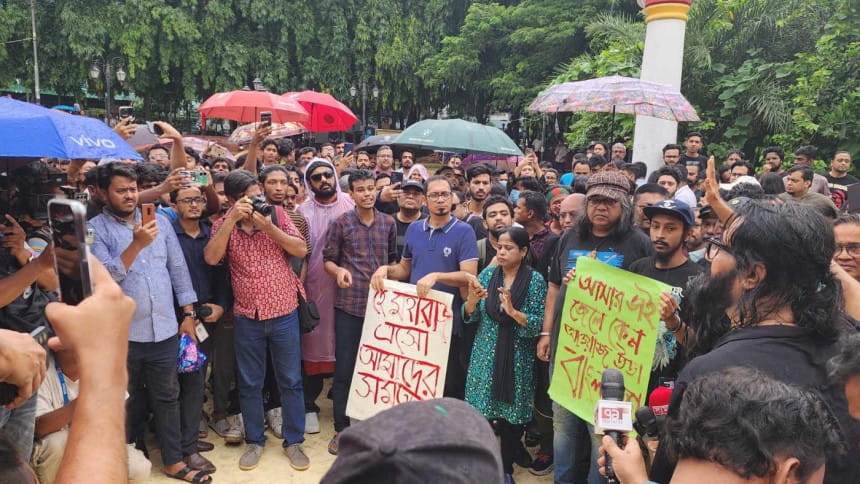
Threats to the cultural arena
After the dream of a new nation, one year passed, and the threat and attacks on the cultural arena still continue. Be it the attack on the Baul Akhra, postponing concerts quoting 'security issues', or creating mob violence to stop female artistes from participating in the inaugural ceremonies of different shops.
"Mob violence has become a major issue, and we're feeling unsafe even to step outside", said Jewel.
"The deterioration of law and order is largely to blame for this. People are committing crimes and still getting away with it — that's one of the key reasons. Things haven't returned to a normal state yet, which is why we're seeing so much mob violence. There may be bits of justice happening here and there, but overall, it's causing more harm than good."
"Whenever a country is in such a vulnerable situation, art and culture are usually the first to be targeted by opportunistic extremists. They just wait for the right moment — and this was a perfect chance for them. In this case, we've seen how fundamentalist forces tried to influence a neutral revolution, and I strongly condemn that. Because for any nation, its art and culture are its backbone, and protecting that is absolutely crucial."
"It is too soon to tell if it's moving right, the can of worms has been opened, and the next 4 years will determine. But I don't see a lot of politicians who inspire me to be honest, most educated/experienced/ moral people stay away from politics, so it's slim pickings for us right now."
"The identity of a country or a nation doesn't lie in its geographical borders, but in its culture — in how its people sing, paint, what they eat, or how they dress. No country can truly develop or prosper as a nation by sidelining its art and culture," Leemon said.
"One hopeful sign is that we've all, to some extent, learned to ask questions. The way the entire nation came together last July, united by a shared dream, gives me reason to believe that our country can, in time, truly become the Shonar Bangla we aspire to. I have dreamt of a Bangladesh where thought, spirit, and integrity stand tall with pride. Where I can hold my head high and say, I am a Bangalee. But if we fail this time, then perhaps we may never get another chance."
Hasan's opinion stands strong as he delves into the issue from the depths. "Now my analysis is that the average IQ of Bangladeshi people is below average. What happens is that these people get used to it easily. Our education system needs to focus more on educating people on morality, and at this point, people don't understand how to learn for their satisfaction in terms of what they want.
They cannot think outside of binary. We judge people, we make them uncomfortable, or demoralise them. I think it is high time that socially we take a step so that people around us are safe with us, and can trust each other. As such future is highly unpredictable."

 For all latest news, follow The Daily Star's Google News channel.
For all latest news, follow The Daily Star's Google News channel. 


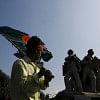




Comments